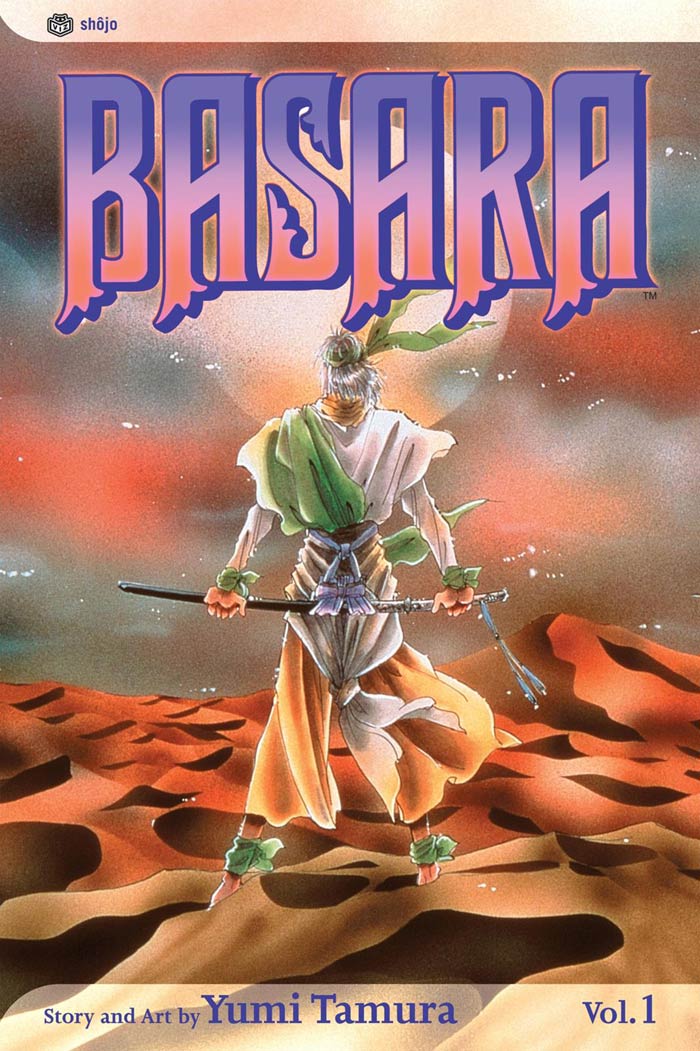
© 1991 Yumi TAMURA/SHOGAKUKAN
A Tale of Two Destinies
[Review copy provided by VIZ, LLC.]
The concept of “love” is, ostensibly, the driving force behind a majority of the shoujo (girls’) manga that have hit North America so far. Our bookshelves are crammed with volumes of romantic, platonic, familial and selfish love framed by wispy visions of hearts and flowers and accompanied by beautiful angst.
Basara, an award-winning series by Yumi Tamura, is also about “love,” but this manga is fraught with a sense of urgency, danger and messiness — in subject matter and in execution — that is atypical of what is found in most comics geared for a feminine audience.
In the future, Japan is a mostly barren land where civilization is just beginning to recover from an event so apocalyptic that today’s cities are rubble and technology, as we know it, is nonexistent. The feudal system of the preceding 300 years has empowered a corrupt despot whose sons each govern a portion of the isolationist island nation in his name.
The commoners have it pretty bad. So when a prophet proclaims that one of the fraternal twins born in a remote desert village is “a child of destiny” — and the one who will lead the nation to freedom — the downtrodden citizens vow to help their favorite son, Tatara, achieve this goal.
But what of the other child? Sarasa is a curious, spunky girl who loves her family and village but is also secretly dismayed by the weight that has been placed on her twin brother’s youthful shoulders. Her concern for him is tinged with both self-doubt and a little envy: If her brother is the “boy of destiny,” what does that make her? The leftover?
Their relatively peaceful life is shattered when Tatara’s existence is brought to the attention of King Ukon XV’s youngest son, and the village is brutally attacked. When the unthinkable occurs, Sarasa must lead her people in Tatara’s stead against the “Red King” — a young prince also prophesized to be the “boy of destiny.”
Basara, Vol. 1 does an efficient job of introducing a myriad of lead and recurring characters while still giving each enough “screen time” to make an impression. Little space is wasted on exposition, and Tamura lets her characters speak for themselves via her expressive illustrations and their in-story actions.
Sarasa is a feisty every-girl, frustrated by the patriarchal society into which she was born but willing to do whatever it takes to help her brother accomplish his mission. Her twin Tatara has a preternatural sense of responsibility fueled by a genuine concern for his people, as well as faith in and affection for his sibling. Nagi, the village wise man, and Ageha, the blue-robed “noble of the desert,” both display a willingness, early on in the manga, to help and challenge the unexpected young leader. And the boy-king’s ruthless cruelty is driven by a startling righteousness.
Tamura seeks out (and finds) love, honor and bravery in unexpected places with surprisingly little sentimentality and with a dry sense of humor that is true to how people actually might react to the situations with which her characters are confronted.
Action-adventure? Romance? Or political thriller? Tamura hints at “all of the above.” Basara, Volume 1 sets the stage for a whip-smart and relationship-driven epic that — true to the translation of its given title — promises to defy convention.
More Info:
BASARA, Vol. 1:
– Reads right-to-left.
– Translated (and overlaid) sound effects.
– Includes “Tam Tam Time” and “Tam Tam Timeline” notes/column by Tamura.
BASARA, Vol. 1 © 1991 Yumi Tamura | Shogakukan First published by Shogakukan, Inc. in Japan as “Basara.” BASARA is a trademark of VIZ, LLC. All rights reserved. New and adapted artwork and text © 2003 VIZ, LLC. All rights reserved.